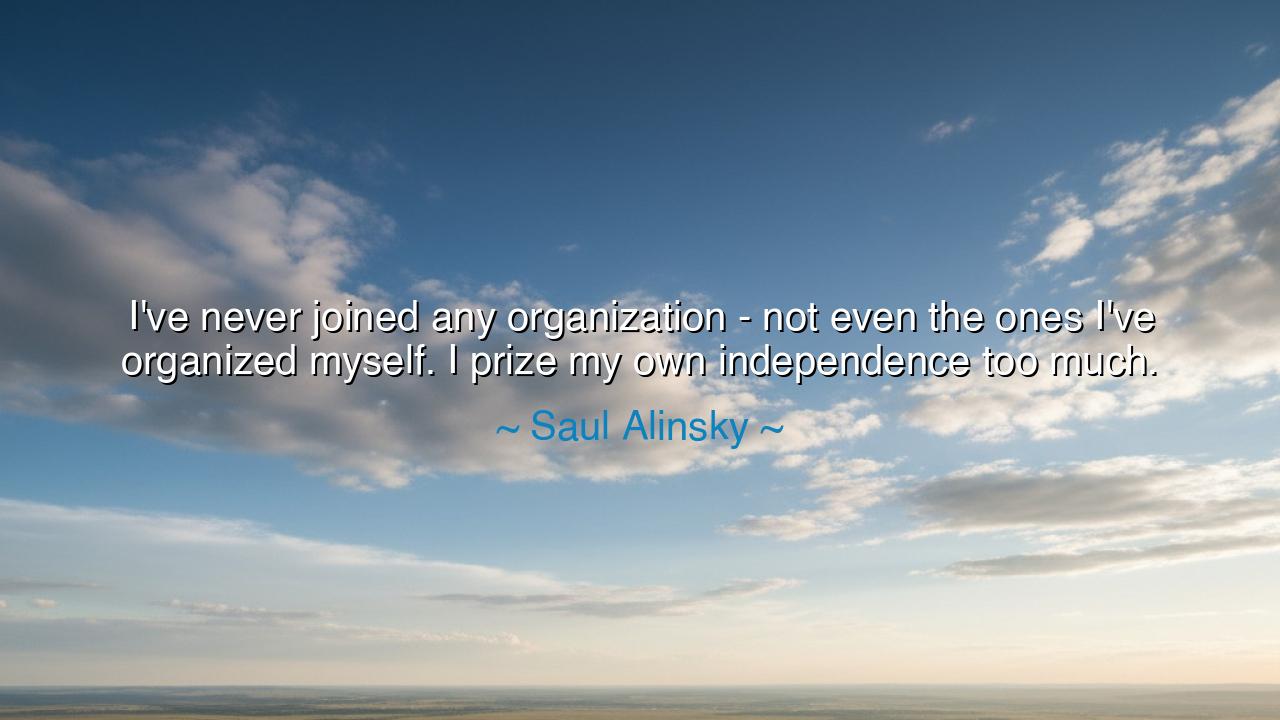
I've never joined any organization - not even the ones I've
I've never joined any organization - not even the ones I've organized myself. I prize my own independence too much.






Listen, O children of the future, to the words of Saul Alinsky, a man who valued independence above all else, even in the face of organizational power. "I've never joined any organization - not even the ones I've organized myself. I prize my own independence too much." These words speak of a deep, unyielding commitment to autonomy, a principle that has guided many throughout history. Alinsky, known for his work in community organizing, understood that while organizations can provide power and influence, the freedom to act on one’s own terms, unencumbered by the control of any external force, is the true source of strength.
In the ancient world, the notion of independence was deeply intertwined with the idea of personal sovereignty. Take, for instance, the story of Diogenes, the Cynic philosopher, who lived in a barrel and rejected all societal norms and conventions. Diogenes prided himself on his freedom, refusing to be bound by the expectations or hierarchies of the city-state of Athens. He chose to live without reliance on wealth, power, or even the basic comforts of society. His life was a rejection of the very idea of dependency, and in doing so, he became an icon of independence, living by his own rules, free from the structures that bound most people. Alinsky, in his own way, echoes this rebellious spirit by resisting the pull of formal organizations, choosing instead the radical independence that allowed him to guide others while remaining free from their influence.
The Romans had a similar understanding of independence, especially in their early Republic. The Roman citizen-soldier, who fought not for personal gain but for the good of the Republic, was considered the ideal of self-reliance. Cincinnatus, the Roman statesman, is often heralded as the epitome of this spirit. Twice he was called to serve as dictator in times of crisis, and twice he resigned power voluntarily to return to his life as a humble farmer. Cincinnatus valued his freedom and independence so deeply that he was unwilling to let the trappings of power define him. Even when given absolute authority, he chose to remain unattached, and by doing so, he preserved his integrity and his place in history. Alinsky, in his own way, rejected the idea of being attached to any organization, understanding that freedom and autonomy would always be more important than the power gained through association.
In the modern world, Alinsky is often remembered for his pioneering work in organizing communities to address social injustices. Yet, his statement about rejecting membership in even the organizations he founded reflects a philosophy that runs deeper than mere activism. Alinsky believed that individual empowerment was the cornerstone of social change. He understood that a person’s ability to think, act, and organize freely was the very thing that would allow for true transformation. To him, becoming beholden to an organization or a movement would mean sacrificing the independence that was necessary to see things clearly and make bold decisions. Just as Diogenes rejected society’s expectations, Alinsky rejected the structures that could limit his ability to act freely and independently, even if they were of his own creation.
The lesson here, O children, is one of great significance: true strength comes not from belonging to any group or organization, but from the independence that allows you to think for yourself, to act with your own conscience as your guide. Alinsky’s refusal to join the organizations he helped create was not a rejection of community or of collective action, but a recognition that the most powerful force an individual can have is the freedom to remain true to their own principles, unfettered by outside influence. This is the true meaning of independence—not isolation, but the strength to choose your own path, regardless of the expectations of those around you.
Consider the story of Mahatma Gandhi, whose life was dedicated to the pursuit of independence, not just for himself, but for an entire nation. Gandhi rejected both the British Empire and the organized political structures of his time, choosing instead a path of personal autonomy and nonviolent resistance. His refusal to adhere to conventional forms of leadership and his deep independence in thought and action were what allowed him to lead India to freedom. Gandhi's leadership was rooted in his ability to remain free from the very structures that sought to control him, and this freedom gave him the power to inspire others to do the same.
So, O children, take these words to heart: strive for independence in all that you do. Do not allow yourself to be bound by organizations, ideologies, or the expectations of others. Let your actions be guided by your own conscience, your own understanding of right and wrong. Just as Alinsky valued his freedom, so too should you cherish your autonomy and make choices that reflect the best version of yourself. Know that true strength lies in your ability to act freely, to question, and to stand for what is right, even when the world around you insists you conform. Only in this freedom will you find your true power, and through this power, you will inspire others to seek the same.






AAdministratorAdministrator
Welcome, honored guests. Please leave a comment, we will respond soon